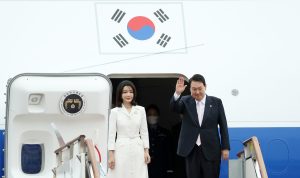To say South Korean President Yoon Suk-yeol has been having a rough first few months in office would be an understatement. From the infamous decision to skip a meeting with U.S. House Speaker Nancy Pelosi to his much-maligned handling of deadly floods in August, the new president has been swamped in a deluge of bad press that has seen his approval rating drop from a post-election high of around 53 percent to just 32 percent this week. Unfortunately, the latest scandal to rock the new administration may be the most serious: a charge that Yoon lied while on the campaign trail.
First, some context. Among the many scandals currently facing the new administration is an ongoing criminal trial with links to the newly elected president’s wife, Kim Keon-hee. From 2010 to 2011, before she married Yoon, Kim shared five personal stock brokerage accounts with three individuals now indicted for stock manipulation. These individuals are alleged to have made use of a total of 91 brokerage accounts (including Kim’s and her mother’s), employing a technique called wash trading to artificially increase the stock price of Deutsche Motors, a Korea-based European car dealership.
Last year, during the presidential campaign, Yoon defended his wife in the middle of a televised debate held on October 15, saying she had no knowledge of the transactions taking place in her accounts. Unfortunately, transcripts of phone calls between Kim and one of the indicted individuals were released in May during court proceedings, demonstrating Kim was aware of at least some of the Deutsche Motors transactions taking place in her accounts.
In addition to the many asking why Kim has not been indicted by the National Prosecution Service (a bureau previously headed by Yoon), the new revelations put Yoon in potential violation of Section 250 of South Korea’s public office election law, which contains specific stipulations against campaigns and candidates spreading misinformation. If candidates are found guilty, they face fines and even removal from office. Unlike similar laws in other countries, the Korean one does not require accusers to prove the intent to mislead, with the act of misinformation alone being sufficient for prosecution.
Ironically, one of the more famous examples of Section 250 being brought to bear against a candidate was in the trial of Lee Jae-myung, Yoon’s opponent in the 2022 presidential election. In 2018, Lee was running for the governorship of Gyeonggi province. During a televised debate, Lee was asked whether he, while serving as the mayor of Seongnam city in 2012, had been involved in forcibly committing his brother to a psychiatric ward. Lee said no and was promptly sued by the opposition candidate for violating Section 250.
Although the details of how Lee’s brother was committed to a psychiatric ward remain murky, with some pertinent documents allegedly having gone missing, Lee was eventually acquitted of the Section 250 charges after over two years of trials and appeals. The final Supreme Court ruling opined that Lee’s statement had been made in response to a question from a rival candidate, falling short of the definition of “spreading misinformation.” The final ruling did not comment on whether Lee had been involved in any misconduct related to his brother’s committal, restricting its opinion to the election charges only.
With Yoon having been formally sued by the opposition liberal party for violating Section 250 on September 5, the ball is now in the court of the National Prosecution Service (NPS). So far, the NPS has not made any formal announcements about how it will proceed. Some are skeptical that the NPS will do anything at all, given Yoon’s long career there as a prosecutor before becoming president.
Since Yoon’s statement about his wife was made in the context of a televised debate, it seems likely that the prior precedent applied to Lee will bring out a similar ruling if the suit against Yoon ever makes it to trial. Kim’s confirmed involvement in stock manipulation does, however, add an intriguing layer of complexity and culpability, perhaps offering some possibility that things might proceed differently. Nevertheless, given that Kim has so far not been indicted by the NPS as an accomplice in the stock manipulation trial, many in the public are concerned the NPS is being derelict in its duties by overlooking offenses committed by Yoon and his family.
Even if exonerated in the end, this scandal and others seem likely to continue undermining the political authority of the Yoon administration, making it difficult to implement new policies. The opposition Democratic Party, for its part, seems intent on continuing to target these scandals for political gain while remaining in control of parliament, diverting time and energy away from cross-party dialogue. With South Korea at an unprecedented crossroads of economic uncertainty due to declining exports, soaring exchange rates, burgeoning debt, and an aging population, the focus on mudslinging seems unlikely to be helpful.
The author would like to thank Soo-min Im of eSTEP Consulting for critical legal research.
































